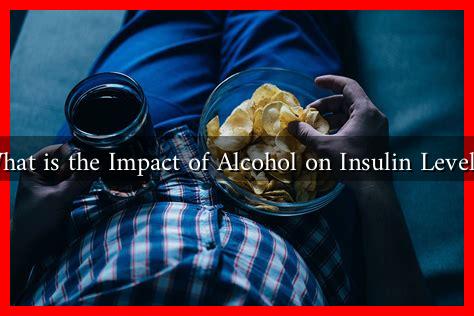-
Table of Contents
What is the Impact of Alcohol on Insulin Levels?
Alcohol consumption is a common social activity, but its effects on health, particularly on insulin levels and glucose metabolism, are often overlooked. Understanding how alcohol interacts with insulin can provide valuable insights for individuals managing diabetes, prediabetes, or those simply looking to maintain a healthy lifestyle. This article explores the relationship between alcohol and insulin levels, the mechanisms involved, and the implications for health.
The Basics of Insulin and Its Role in the Body
Insulin is a hormone produced by the pancreas that plays a crucial role in regulating blood sugar levels. It facilitates the uptake of glucose into cells, where it can be used for energy or stored for future use. When insulin levels are disrupted, it can lead to various health issues, including insulin resistance, type 2 diabetes, and metabolic syndrome.
How Alcohol Affects Insulin Levels
The impact of alcohol on insulin levels is complex and can vary based on several factors, including the type of alcohol consumed, the amount, and individual metabolic responses. Here are some key points to consider:
- Acute Effects: Moderate alcohol consumption can lead to a temporary decrease in insulin sensitivity. This means that the body may not respond as effectively to insulin, potentially leading to higher blood sugar levels.
- Chronic Consumption: Long-term heavy drinking is associated with insulin resistance, which can increase the risk of developing type 2 diabetes. Studies have shown that individuals who consume large amounts of alcohol regularly are more likely to experience metabolic disturbances.
- Type of Alcohol: Different types of alcoholic beverages can have varying effects on insulin levels. For instance, sugary cocktails may cause a more significant spike in blood sugar compared to dry wines or spirits.
Case Studies and Research Findings
Numerous studies have investigated the relationship between alcohol consumption and insulin levels. For example, a study published in the journal Diabetes Care found that moderate alcohol consumption was associated with a lower risk of developing type 2 diabetes compared to non-drinkers. However, this protective effect was not observed in heavy drinkers.
Another research study highlighted in the American Journal of Clinical Nutrition indicated that binge drinking could lead to acute hyperglycemia, which is a temporary increase in blood sugar levels. This effect can be particularly dangerous for individuals with diabetes, as it may lead to complications if not managed properly.
Moderation is Key
For those who choose to consume alcohol, moderation is essential. The Centers for Disease Control and Prevention (CDC) defines moderate drinking as up to one drink per day for women and up to two drinks per day for men. Here are some tips for responsible alcohol consumption:
- Choose lower-sugar options, such as dry wines or spirits mixed with soda water.
- Monitor your blood sugar levels before and after drinking to understand how your body responds.
- Stay hydrated by drinking water alongside alcoholic beverages.
- Consult with a healthcare professional, especially if you have diabetes or other metabolic conditions.
Conclusion
The impact of alcohol on insulin levels is multifaceted and can vary significantly based on individual circumstances. While moderate alcohol consumption may have some protective effects against type 2 diabetes, excessive drinking poses serious risks, including insulin resistance and metabolic syndrome. Understanding these dynamics is crucial for anyone looking to manage their health effectively.
In summary, if you choose to drink alcohol, do so in moderation and be mindful of its potential effects on your insulin levels and overall health. Always consult with healthcare professionals for personalized advice, especially if you have existing health conditions. By making informed choices, you can enjoy social occasions while maintaining your health and well-being.


